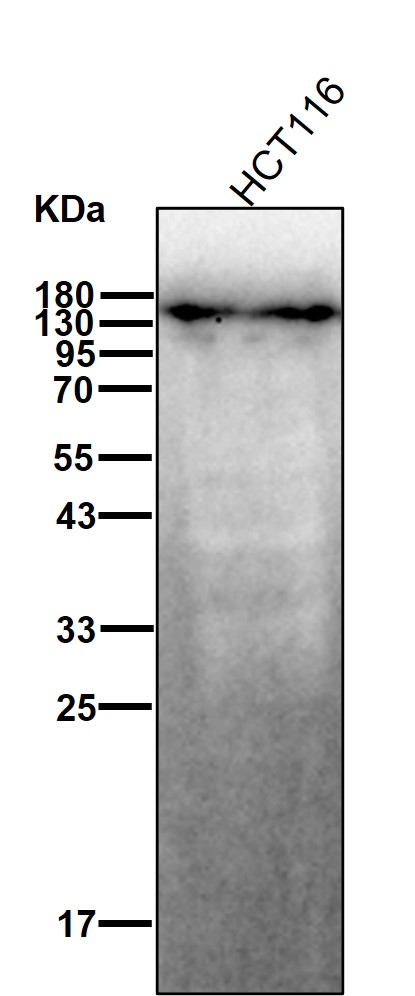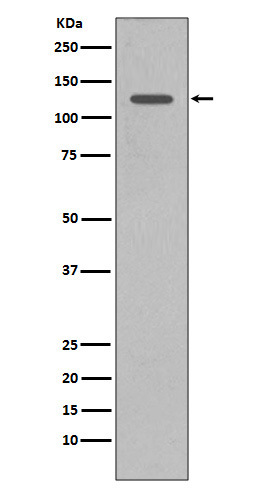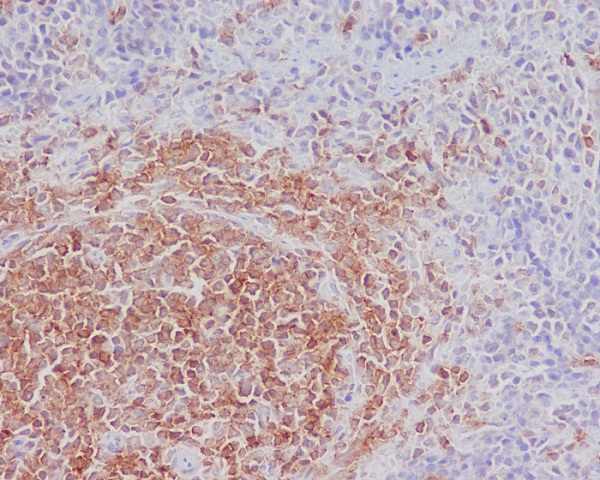


| WB | 咨询技术 | Human,Mouse,Rat |
| IF | 1/20-1/50 | Human,Mouse,Rat |
| IHC | 1/100-1/200 | Human,Mouse,Rat |
| ICC | 技术咨询 | Human,Mouse,Rat |
| FCM | 1/20-1/100 | Human,Mouse,Rat |
| Elisa | 咨询技术 | Human,Mouse,Rat |
| Aliases | Inositol polyphosphate-5-phosphatase of 145 kDa; inositol polyphosphate-5-phosphatase, 145kDa; INPP5D; p150Ship;;INPP5D |
| WB Predicted band size | Calculated MW: 133 kDa ; Observed MW: 140 kDa |
| Host/Isotype | Rabbit IgG |
| Antibody Type | Primary antibody |
| Storage | Store at 4°C short term. Aliquot and store at -20°C long term. Avoid freeze/thaw cycles. |
| Species Reactivity | Human |
| Immunogen | A synthesized peptide derived from human INPP5D |
| Formulation | Purified antibody in PBS with 0.05% sodium azide,0.05% BSA and 50% glycerol. |
+ +
以下是关于SHIP抗体的3篇参考文献及其摘要概括:
1. **文献名称**:*SHIP, a new player in cytokine-induced signalling*
**作者**:Lioubin, M. N., et al.
**摘要内容**:该研究首次克隆并鉴定了SHIP(含SH2结构域的肌醇磷酸酶),开发了特异性抗体用于检测其表达。研究发现SHIP通过水解PIP3负调控细胞因子信号通路,尤其在造血细胞中抑制PI3K-Akt通路的过度激活。
2. **文献名称**:*SHIP prevents lipopolysaccharide-induced cytokine production in macrophages*
**作者**:Sly, L. M., et al.
**摘要内容**:通过SHIP抗体及基因敲除技术,研究揭示了SHIP在巨噬细胞中的抗炎作用。SHIP缺陷导致LPS刺激下NF-κB活性增强,促炎细胞因子(如TNF-α、IL-6)分泌增加,表明其通过调控TLR4信号抑制过度炎症反应。
3. **文献名称**:*SHIP deficiency enhances integrin signaling in B lymphocytes*
**作者**:Maxwell, M. J., et al.
**摘要内容**:该研究利用SHIP抗体分析蛋白表达,发现SHIP缺失的B淋巴细胞中整合素信号通路异常增强,导致细胞迁移和黏附能力上调,提示SHIP在维持B细胞稳态及抑制自身免疫反应中的关键作用。
这些文献涵盖了SHIP抗体的开发应用及其在免疫信号调控中的机制研究,涉及炎症、白血病及免疫细胞功能等领域。
SHIP (Src homology 2 domain-containing inositol phosphatase) is a lipid phosphatase that plays a critical role in regulating immune cell signaling. Discovered in the mid-1990s, SHIP is primarily expressed in hematopoietic cells, including B cells, T cells, mast cells, and macrophages. Its structure includes an N-terminal SH2 domain, a central catalytic domain with inositol phosphatase activity, and C-terminal proline-rich regions for protein interactions.
Functionally, SHIP modulates phosphatidylinositol 3-kinase (PI3K) signaling by hydrolyzing phosphatidylinositol (3.4.5)-trisphosphate (PIP3) to phosphatidylinositol (3.4)-bisphosphate (PIP2), thereby limiting Akt activation and downstream pathways involved in cell survival, proliferation, and activation. This negative regulatory role makes SHIP crucial for maintaining immune homeostasis, preventing excessive inflammation, and controlling autoimmune responses.
SHIP antibodies are essential tools for studying its expression, localization, and activity in immune regulation. Dysregulation of SHIP has been linked to diseases like leukemia, allergies, and autoimmune disorders. Therapeutic strategies targeting SHIP (e.g., agonists or inhibitors) are under exploration to modulate immune responses in cancer or inflammatory conditions. Research on SHIP continues to uncover its broader roles in metabolism, apoptosis, and phagocytosis, highlighting its significance as a multifaceted regulator in immunity and disease.
×